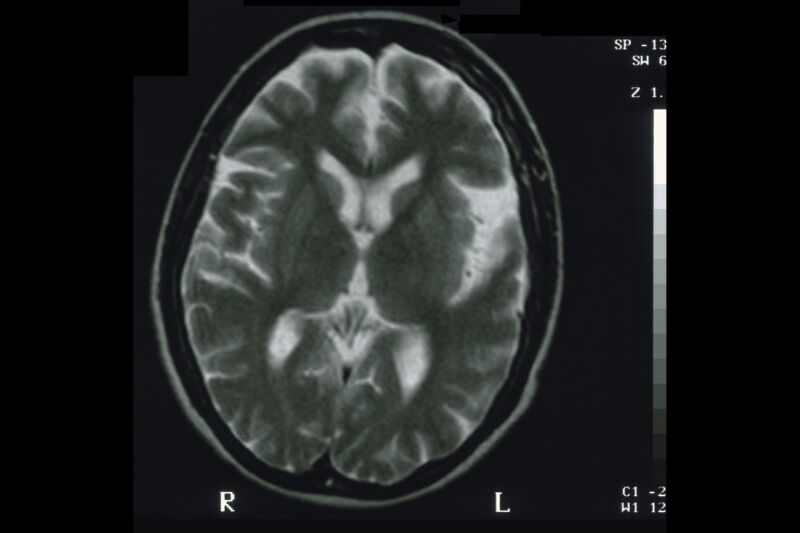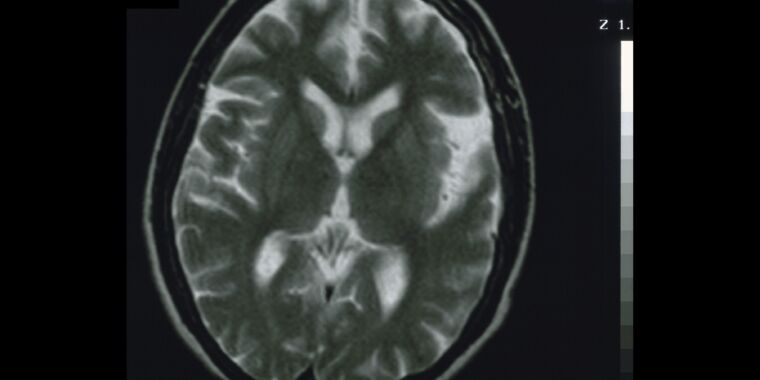
The Food and Drug Administration on Friday granted accelerated approval for a new Alzheimer’s disease treatment that may slightly slow the progression of cognitive decline in the early stages of the disease, but also increases the risk of brain hemorrhage and swelling.
The treatment — lecanemab, brand name Leqemb, made by pharmaceutical companies Eisai and Biogen — is an intravenous monoclonal antibody that targets amyloid beta proteins, which accumulate in plaques in the brains of people with Alzheimer’s disease. Researchers have not yet definitively determined whether amyloid plaques are a root cause of the disease, nor whether removing them can significantly slow or halt cognitive decline.
FDA approval of lecanemab is through an accelerated pathway, using “a surrogate endpoint that can reasonably predict clinical benefit to patients.” In this case, the surrogate endpoint was lecanemab’s ability to reduce beta-amyloid plaques in the brains of Alzheimer’s patients.
Uncertain efficacy
But its significance and efficacy of the drug are still uncertain. In a phase III clinical trial published this week in the New England Journal of Medicine, treatment with lecanemab for 18 months only slightly slowed cognitive decline in patients with early Alzheimer’s. The trial included 1,795 participants – 898 were assigned lecanemab and 897 were assigned a placebo. Their cognitive abilities were assessed using an 18-point scale from an established clinical test for dementia. At the start of the trial, both groups (treatment and placebo) had a baseline score of about 3.2 on the test. After the 18-month trial, the lecanemab treatment group’s score fell by 1.21 points, while that of the placebo group fell by 1.66 points — a difference of 0.45 points that equates to a 27 percent slower rate of decline in the treatment group .
It is unclear whether that change makes sense. Dr. Madhav Thambisetty, a neurologist and a senior researcher at the National Institute on Aging who spoke to The New York Times, said the drug’s ability to clear amyloid plaques was “exciting” from a scientist’s perspective. But “from the perspective of a physician caring for Alzheimer’s patients, the difference between lecanemab and placebo is well below what is considered a clinically meaningful treatment effect.”
The researchers behind the clinical trial noted in their conclusion that “longer trials are warranted to determine the efficacy and safety of lecanemab in early-stage Alzheimer’s disease.”
Safety concerns
Meanwhile, the treatment has sparked safety concerns, particularly amid reports that three patients given the drug have died from brain swelling and bleeding. So did a 65-year-old woman with early stage cognitive decline who died of a massive cerebral hemorrhage. Rudolph Castellani, a Northwestern Medicine neuropathologist who studies Alzheimer’s disease and performed an autopsy on the woman at the request of her husband, told Science last November that he believed the drug weakened the woman’s blood vessels, which then burst from a usual treatment for blood clots after she had a stroke.
“It was a one-two punch,” Castellani told Science, which first reported the death. “I have no doubt that this is treatment-induced illness and death. If the patient had not taken lecanemab, she would be alive today.”
An account of the woman’s death was also published this week in the New England Journal of Medicine.
Lecanemab prescribing information includes warnings and cautions about brain bleeding and swelling and the use of blood thinners.
The FDA’s approval comes just a week after lawmakers released the results of an 18-month congressional investigation into the agency’s much-criticized approval of a similar Alzheimer’s drug, Aduhelm. Data on that amyloid-targeted antibody therapy was even less conclusive than that of lecanamab, and the FDA granted approval after objections from its external advisory panel and in-house experts.
Irregularities
The congressional investigation found that the FDA’s approval process was “full of irregularities” and “improper” communication between the FDA and Aduhelm’s maker, Biogen. The report also condemned Biogen for setting “an unjustifiably high price” of $56,000 a year for Aduhelm.
“This report documents the atypical FDA review process and corporate greed that preceded the FDA’s controversial decision to grant accelerated approval to Aduhelm,” said Frank Pallone, Jr. (D-NJ), the incoming ranking member of the Energy and Commerce Committee.
Following the approval of lecanemab, Pallone released a statement saying, “I am hopeful that lecanemab will deliver on its promise to slow the progression of Alzheimer’s disease for patients and their loved ones. I am also hopeful that Eisai and Biogen have learned from past mistakes and will price lecanemab fairly to ensure patients have fair access to this drug.
In a Friday afternoon press release, Eisai announced it is pricing lecanemab at $26,500 for a year’s supply. That’s above the range the Institute for Clinical and Economic Review estimated for the drug to be cost-effective, which the analysis group put at between $8,500 and $20,600 for a year of treatment.
It’s unclear if Medicare will cover lecanemab, which will dramatically affect its marketability. Medicare strictly limited coverage of Aduhelm, due to its high price, lack of evidence of benefits and risks. Only Medicare beneficiaries in clinical trials have coverage for the price of Aduhelm, which has since been reduced to $28,200 for an annual supply.

